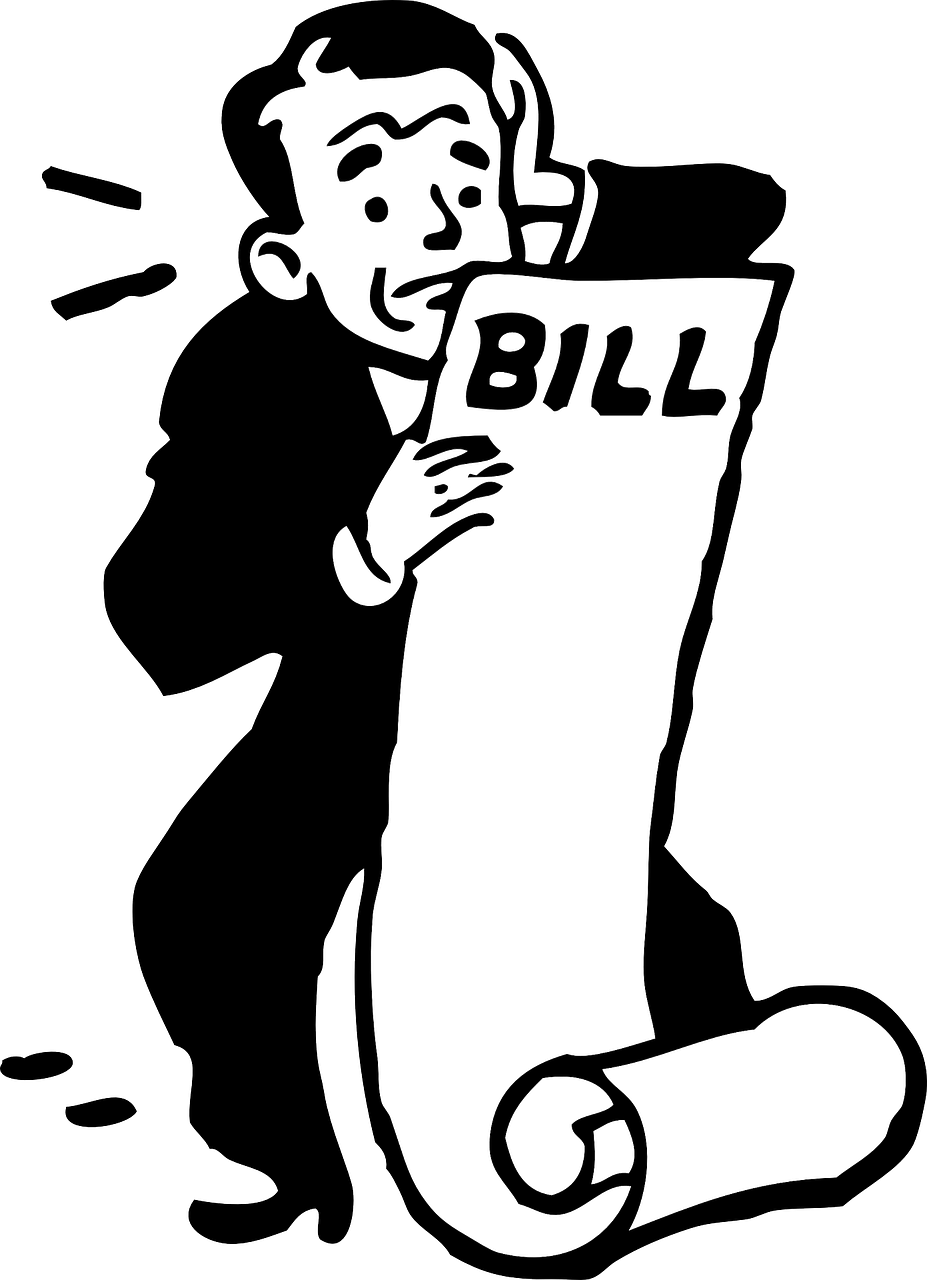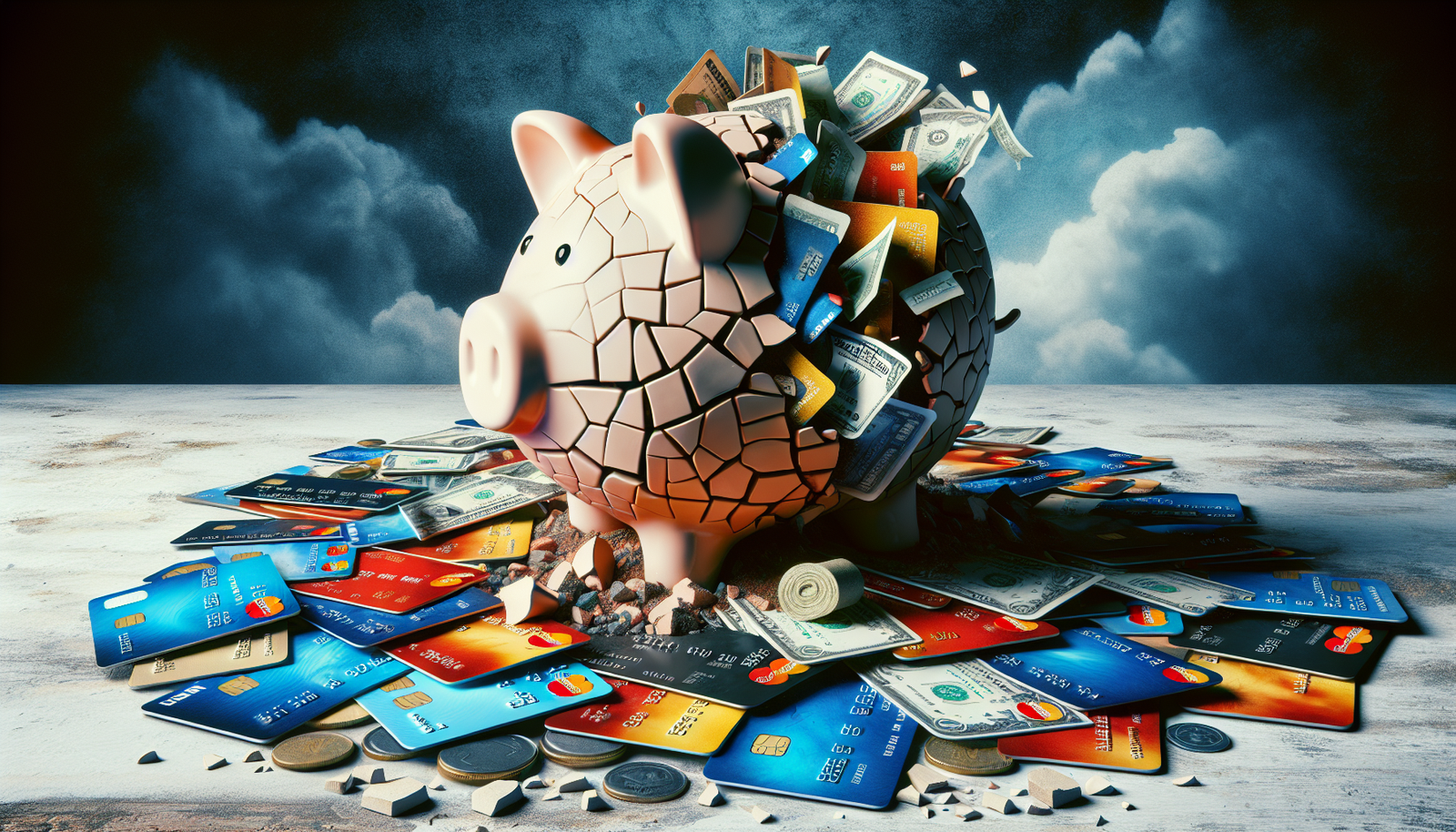Having high credit card debt may seem like a minor inconvenience in the present moment, but it could have a significant impact on your ability to qualify for future loans. It’s important to be aware of the repercussions that excessive credit card debt can have on your financial future. In this article, we will explore how having high credit card debt affects your eligibility for other loans and why it’s crucial to keep your debt in check. So, let’s dive in and discover the potential consequences of carrying a heavy burden of credit card debt on your journey towards financial stability.
What is Credit Card Debt?
Credit card debt refers to the amount of money that you owe on your credit card. It is the balance that you carry from month to month after making purchases using your credit card. When you use a credit card, you are essentially borrowing money from the card issuer with the promise to repay it later. If you don’t pay off the full amount each month, the remaining balance accumulates and becomes your credit card debt.
Causes of Credit Card Debt
There are various reasons why people accumulate credit card debt. One of the main causes is overspending. It’s easy to fall into the trap of using credit cards to make purchases that you can’t afford to pay off immediately. Additionally, unexpected financial emergencies, such as medical bills or car repairs, can also contribute to credit card debt. Another common cause is the lack of financial literacy, where individuals may not fully understand the consequences of carrying a balance on their cards and the impact it can have on their financial well-being.
How Credit Card Debt Affects the Ability to Qualify for Other Loans
Having high credit card debt can significantly impact your ability to qualify for other loans. Lenders and financial institutions take into consideration several factors when evaluating loan applications, and your credit card debt plays a crucial role in this assessment.
Increased Debt-to-Income Ratio
The debt-to-income ratio is a financial metric used by lenders to determine a borrower’s ability to repay their debts. It is calculated by dividing your total monthly debt payments by your gross monthly income. High credit card debt increases your debt-to-income ratio, making it appear as if a significant portion of your income is already allocated towards debt repayment. This can raise red flags for lenders and make them hesitant to approve you for additional loans.
Low Credit Score
Your credit score is a numerical representation of your creditworthiness. It is a reflection of your credit history, including your payment history, credit utilization, and the length of your credit history. High credit card debt can have a negative impact on your credit score, as it increases your credit utilization ratio, which is the percentage of your available credit that you are currently using. A high credit utilization ratio can signal to lenders that you may be relying too heavily on credit, which can result in a lower credit score.
Negative Impact on Credit History
Your credit history is a record of how responsibly you have managed credit in the past. It includes information about your payment history, any missed or late payments, and the amount of debt you currently owe. High credit card debt can negatively impact your credit history, especially if you have a history of missed or late payments. Lenders view a negative credit history as a sign of financial instability, which can make it challenging to qualify for other loans.
Lenders’ Perception of Financial Stability
When assessing loan applications, lenders evaluate an individual’s financial stability. High credit card debt can affect lenders’ perception of your financial stability, as it indicates a reliance on credit and potentially a lack of control over your finances. Lenders prefer borrowers who demonstrate responsible financial behavior, including manageable levels of debt. Therefore, having substantial credit card debt can make lenders hesitant to approve you for other loans.

Increased Debt-to-Income Ratio
Explanation of Debt-to-Income Ratio
The debt-to-income ratio is a measurement used by lenders to assess the amount of debt an individual carries relative to their income. It is calculated by dividing the total monthly debt payments by the gross monthly income. For example, if your total monthly debt payments amount to $1,500 and your gross monthly income is $5,000, your debt-to-income ratio would be 30%. A higher debt-to-income ratio indicates a higher likelihood of struggling to meet new debt obligations, making lenders less likely to approve your loan application.
Impact on Loan Eligibility
A high debt-to-income ratio can significantly impact your ability to qualify for other loans. Lenders generally have a maximum debt-to-income ratio that they are willing to accept, with a lower ratio being more favorable. When your debt-to-income ratio is high due to credit card debt, lenders may view you as a higher credit risk. They may worry that you won’t have enough income to comfortably manage additional debt payments, leading to a higher likelihood of defaulting on the loan.
Ways to Reduce Debt-to-Income Ratio
To improve your eligibility for other loans, it’s essential to reduce your debt-to-income ratio. One way to achieve this is by focusing on reducing your credit card debt. Consider developing a budget to track your income and expenses and allocate more funds towards paying off your credit card balances. Additionally, you may want to explore options such as refinancing existing loans or seeking debt consolidation to lower your monthly debt payments and consequently improve your debt-to-income ratio.
Low Credit Score
Role of Credit Score in Loan Approval
Your credit score plays a significant role in the loan approval process. It is a numerical representation of your creditworthiness and gives lenders an idea of how likely you are to repay them on time. A high credit score demonstrates responsible credit management and increases your chances of getting approved for other loans at lower interest rates. Conversely, a low credit score indicates potential financial risk and may result in higher interest rates or loan denials.
Impact of High Credit Card Debt on Credit Score
High credit card debt can have a negative impact on your credit score. As mentioned earlier, credit utilization, which is the amount of credit you are using compared to your total credit limit, is an important factor in calculating your credit score. When you have a significant amount of credit card debt, it increases your credit utilization ratio and signals to credit bureaus that you may be financially stretched. This can result in a lower credit score, reducing your chances of qualifying for other loans.
Ways to Improve Credit Score
Improving your credit score is crucial to enhance your ability to qualify for other loans. Consider implementing these strategies to boost your credit score:
- Pay your credit card bills on time: Ensure that you make timely payments towards your credit card debt. Late payments can have a significant negative impact on your credit score.
- Pay off outstanding balances: Reduce your credit card debt by paying more than the minimum amount due each month. This lowers your credit utilization ratio and demonstrates responsible credit management.
- Monitor your credit report: Regularly check your credit report for errors or discrepancies that may be dragging down your credit score. Dispute any inaccuracies to have them corrected.
- Avoid opening unnecessary credit accounts: Applying for multiple credit cards or loans within a short period of time can adversely affect your credit score. Only open new credit accounts when necessary.

Negative Impact on Credit History
Importance of a Good Credit History
A good credit history is essential for obtaining favorable loan terms and interest rates. Lenders use your credit history to assess your creditworthiness and determine the level of risk associated with lending to you. A positive credit history, with a record of responsible credit management and on-time payments, inspires confidence in lenders and increases your chances of qualifying for other loans.
Effect of High Credit Card Debt on Credit History
High credit card debt can have a negative effect on your credit history, particularly if you have a history of missed or late payments. Late payments can stay on your credit report for up to seven years, which can significantly impact your creditworthiness. Additionally, if you have a habit of carrying high credit card balances, it can indicate to lenders that you may be relying too heavily on credit and may struggle to manage additional loans.
Steps to Repair Credit History
If high credit card debt has negatively affected your credit history, it is not a permanent situation. There are steps you can take to repair your credit history:
- Pay your bills on time: Consistently making on-time payments demonstrates responsible credit management and helps rebuild your credit history over time.
- Lower your credit card balances: Focus on reducing your credit card debt to lower your credit utilization ratio. Keeping your balances below 30% of your credit limit is generally recommended.
- Dispute errors on your credit report: Regularly review your credit report and report any errors to the credit bureau. Having inaccuracies corrected can help improve your credit history.
- Maintain a long credit history: The length of your credit history is an essential factor in calculating your credit score. Avoid closing old credit card accounts, as they contribute to the overall length of your credit history.
Lenders’ Perception of Financial Stability
Lenders’ Assessment of Creditworthiness
When evaluating loan applications, lenders assess an individual’s creditworthiness, which determines the level of financial risk they’re willing to take on. Lenders consider factors such as credit history, credit score, income stability, and debt-to-income ratio to gauge an individual’s ability to repay the loan. A favorable assessment of creditworthiness increases the likelihood of loan approval and can result in more advantageous terms and interest rates.
How High Credit Card Debt Affects Perceived Financial Stability
High credit card debt can negatively impact lenders’ perception of your financial stability. When you carry a significant amount of credit card debt, it suggests that you may be struggling with managing your finances and relying on credit to maintain your lifestyle. Lenders prefer borrowers who demonstrate responsible financial behavior and have a manageable debt load, as it reduces the risk of defaulting on the loan.
Strategies to Convey Financial Stability
To convey financial stability to lenders despite high credit card debt, consider implementing the following strategies:
- Create a budget and stick to it: Demonstrating financial discipline and creating a realistic budget can show lenders that you have a plan for managing your debt and expenses.
- Pay off high-interest debt first: Prioritize paying off your high-interest credit card debt to reduce your overall debt load and demonstrate your commitment to responsible debt management.
- Maintain stable employment: Lenders value stable income as it provides assurances that you’ll be able to make loan payments on time. Strive for consistent employment and avoid frequent job changes.
- Provide additional collateral: If possible, offer additional collateral when applying for loans to mitigate the perceived risk associated with your credit card debt. This can increase lenders’ confidence in your loan repayment ability.

Types of Loans Affected
Having high credit card debt can impact various types of loans, including mortgages, auto loans, personal loans, and student loans. Let’s explore how each of these loans can be affected.
Mortgages
Explanation of Mortgage Loans
A mortgage loan is a type of loan used to finance the purchase of a home. It is typically a long-term loan, usually spanning 15 to 30 years, and secured by the property itself. Mortgage loans often require a significant down payment and are repaid through monthly installments, including both principal and interest payments.
Impact of High Credit Card Debt on Mortgage Eligibility
Having high credit card debt can affect your eligibility for a mortgage loan. Mortgage lenders consider the debt-to-income ratio, credit score, and credit history when evaluating mortgage applications. High credit card debt can increase your debt-to-income ratio, making it more challenging to meet the lender’s requirements. Additionally, a lower credit score resulting from high credit card debt can lead to less favorable mortgage terms, such as higher interest rates or the requirement for a larger down payment.
Steps to Improve Mortgage Eligibility
To improve your eligibility for a mortgage loan despite high credit card debt, consider taking the following steps:
- Pay down your credit card debt: Focus on reducing your credit card balances to decrease your debt-to-income ratio. This can increase your chances of meeting the lender’s requirements.
- Improve your credit score: Take steps to improve your credit score by making on-time payments, reducing credit card balances, and addressing any errors on your credit report.
- Save for a larger down payment: If you can save for a larger down payment, it can help offset the perceived risk associated with your high credit card debt. It demonstrates your commitment and ability to manage your finances responsibly.
Auto Loans
Role of Credit in Auto Loan Approval
Credit plays a significant role in the approval process for auto loans. Lenders use your credit history, credit score, and debt-to-income ratio to assess your ability to repay the loan. A good credit score and a positive credit history increase your chances of getting approved for an auto loan at favorable interest rates.
Effect of High Credit Card Debt on Auto Loan Eligibility
High credit card debt can impact your eligibility for an auto loan. Lenders consider your debt-to-income ratio when evaluating your ability to manage additional debt. If your debt-to-income ratio is high due to credit card debt, it can raise concerns about your ability to meet your auto loan obligations. Additionally, a lower credit score resulting from high credit card debt can lead to higher interest rates or a loan denial.
Tips for Qualifying for an Auto Loan
To increase your chances of qualifying for an auto loan despite high credit card debt, consider the following tips:
- Pay down credit card debt: Reducing your credit card balances can lower your debt-to-income ratio, making you a more favorable candidate for an auto loan.
- Shop around for lenders: Different lenders may have different eligibility criteria and may be more lenient towards borrowers with high credit card debt. It can be beneficial to shop around and compare loan offers from multiple lenders.
- Consider a co-signer: If your credit card debt is hampering your ability to qualify for an auto loan, you may consider asking a trusted individual with good credit to co-sign the loan. A co-signer with a better credit history can increase your chances of loan approval.
Strategies to Manage High Credit Card Debt
If you find yourself burdened with high credit card debt, there are several strategies you can employ to regain control of your finances and improve your ability to qualify for other loans.
Creating a Repayment Plan
Developing a repayment plan is crucial to tackle high credit card debt effectively. Start by listing all your credit card balances, interest rates, and minimum monthly payments. Allocate as much money as possible towards paying off the cards with the highest interest rates first, while still making minimum payments on the others. As you pay off one card, move on to the next, utilizing the snowball or avalanche method to gain momentum and pay off debt faster.
Consolidating Credit Card Debt
Another strategy to manage high credit card debt is to consolidate it into a single loan with a lower interest rate. Debt consolidation involves taking out a loan to pay off all your credit card balances, consolidating them into one monthly payment. This can simplify your finances and potentially lower your interest charges, making it easier to manage your debt and pay it off faster.
Seeking Professional Advice
If you’re struggling to manage high credit card debt on your own, seeking professional advice can be beneficial. Credit counseling agencies can provide guidance and assistance in developing a personalized debt repayment plan. They can negotiate with creditors on your behalf to potentially lower interest rates or establish a repayment schedule that is more manageable for you.
In conclusion, high credit card debt can have a significant impact on your ability to qualify for other loans. It increases your debt-to-income ratio, lowers your credit score, negatively impacts your credit history, and affects lenders’ perception of your financial stability. However, by implementing strategies to reduce debt, improve credit scores, and convey financial stability, you can enhance your chances of qualifying for other loans. Remember to prioritize responsible credit management, pay off debt in a timely manner, and seek professional advice when necessary.


